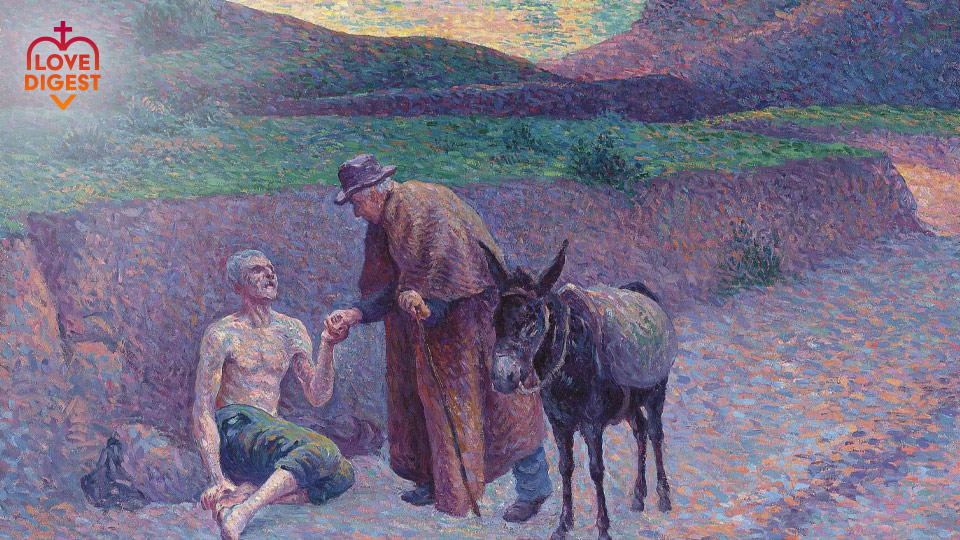“It’s a beautiful day in this neighbourhood, a beautiful day for a neighbour. Would you be mine? Could you be mine?”
Although they were written to accompany a children’s program, these timeless lyrics of Mr. Rogers continue to be relevant throughout our lives and are especially relevant now in the midst of a global pandemic. COVID-19 may not seem like such a beautiful day in the neighbourhood of humanity, but it has reminded us what we all know deep down: that being a neighbour is so much more than simply living next door. Being a neighbour means caring for others, lending a helping hand, and offering assistance.
We don’t choose our neighbours. But we do choose what kind of neighbours we are.
To show us what being a neighbour is all about, Jesus tells the story of a Samaritan foreigner who stops to take care of a Jewish man who was mugged and left for dead (
Luke 10:25-37). Everyone else passes by, but the Samaritan cannot allow himself to look the other way. Despite the deep-seated hatred between Samaritans and Jews, this Good Samaritan springs into action while others have pretended nothing has happened. The foreign Samaritan was a better neighbour to the Jew than the man’s own people.
The parable forces us to ask ourselves: Are we indifferent to the needs of others? Do we care that there are people in need in our communities and across the globe? Every day we make a choice: to be bystanders who try to ignore or Good Samaritans who bend down and help out. We may not
intend to be indifferent, but if we do nothing in the face of the real needs we see, like it or not we are being indifferent.
But who are my neighbours?
Writing about this parable, Pope Francis says, “Jesus does not ask us to decide who is close enough to be our neighbour, but rather that we ourselves become neighbours to all” (
Fratelli Tutti, no. 80). Someone is my neighbour simply because he is human. And truly being a neighbour, especially to those most in need, makes me more human.
Thus the question for us is not “Who are my neighbours?” or “Should I be a neighbour?” The real question is:
How am I a neighbour?
Saint John Henry Newman said that the best way of loving the world at large is to start by loving those immediately around us. After all, how can we love someone on the other end of the globe if we are not attentive to those around us? Loving our neighbour starts in our families, with our parents, children, spouses, and siblings. Next we serve others through our work or studies. As we go about our daily routine, we have to let ourselves be touched by the needs we observe around us. Then we have to find ways to respond to those needs. That’s what being a neighbour is all about.
No one person can solve all the problems of the world or meet all of the needs that surround us. But if each of us strives to do what we can, imagine what an impact it would have on our world!
The challenge for us is to take the next step to being a better neighbour today. COVID may not make this easy, but it makes it all the more urgent and essential. Who can I call that might be suffering from loneliness and isolation? How can I donate food, clothing, or money to a worthy cause – both in my own backyard and on the opposite end of the planet? How can I reconnect with a relative or friend that I haven’t contacted in a long time? How can I stand up for victims of violence, discrimination, and abuse? How can I intentionally pray for various groups of people in need? What creative ways can I find to embrace those most in need, even if we have to maintain “social distancing”?
Our faith tells us that the way we love our neighbour is the truest test of whether we really know God. As God’s heart reaches out to us in our neediness, so we are called to reach out and touch the needs of others. How can we become true neighbours with the heart of God for those in need?
We have Mr. Rogers’ words to encourage us:
“So let’s make the most of this beautiful day. Since we’re together we might as well say… Please won’t you be my neighbour?”
Julian would be happy to hear from you, with any questions, insights, or suggestions you may have regarding this blog series. He can be reached at [email protected].

 Julian Paparella is a theology student at the John Paul II Institute for Marriage and Family Studies in Rome. Born and raised in London, Ontario, he has worked in pastoral ministry in Montreal and Paris, especially with young people. Julian strives to communicate our faith in a way that resonates with everyday life, helping people to better experience God today. He is engaged to be married to Marion.
Julian Paparella is a theology student at the John Paul II Institute for Marriage and Family Studies in Rome. Born and raised in London, Ontario, he has worked in pastoral ministry in Montreal and Paris, especially with young people. Julian strives to communicate our faith in a way that resonates with everyday life, helping people to better experience God today. He is engaged to be married to Marion.


 Julian Paparella is a theology student at the John Paul II Institute for Marriage and Family Studies in Rome. Born and raised in London, Ontario, he has worked in pastoral ministry in Montreal and Paris, especially with young people. Julian strives to communicate our faith in a way that resonates with everyday life, helping people to better experience God today. He is engaged to be married to Marion.
Julian Paparella is a theology student at the John Paul II Institute for Marriage and Family Studies in Rome. Born and raised in London, Ontario, he has worked in pastoral ministry in Montreal and Paris, especially with young people. Julian strives to communicate our faith in a way that resonates with everyday life, helping people to better experience God today. He is engaged to be married to Marion.